``Do you want to keep your current gender when you are reborn? Or do you want to be reborn as the opposite gender?'' This question, posed by Professor Chung of the Faculty of Culture and Information Studies, is based on the ``Japanese National Character Survey,'' which has been ongoing since 1953. ” is one of the items.Looking at the data, we see that there has been a change in the responses over the past 50 years. The percentage of women who answered, "I want to be reborn as a man," has been decreasing year by year from the initial 7%, and has reversed to 3% in the latest survey.Everyone would probably answer that this is due to the influence of women's advancement into society.So, do you really feel that Japan has become a society where women can really play an active role and where it is easy to live?Professor Chung poses a question. ``Currently, there are still many areas that need improvement, such as the wage gap and the issue of separate surnames for couples.'' By analyzing data that cannot be quantified, such as respondents' age groups, areas of residence, and occupations, it is necessary to find ``patterns'' in responses. is the role of quantitative sociology.”
What kind of study is quantitative sociology, which helps analyze human society and improve it?We spoke to Professor Chung about data science, which is expected to be in increasing demand in the future.
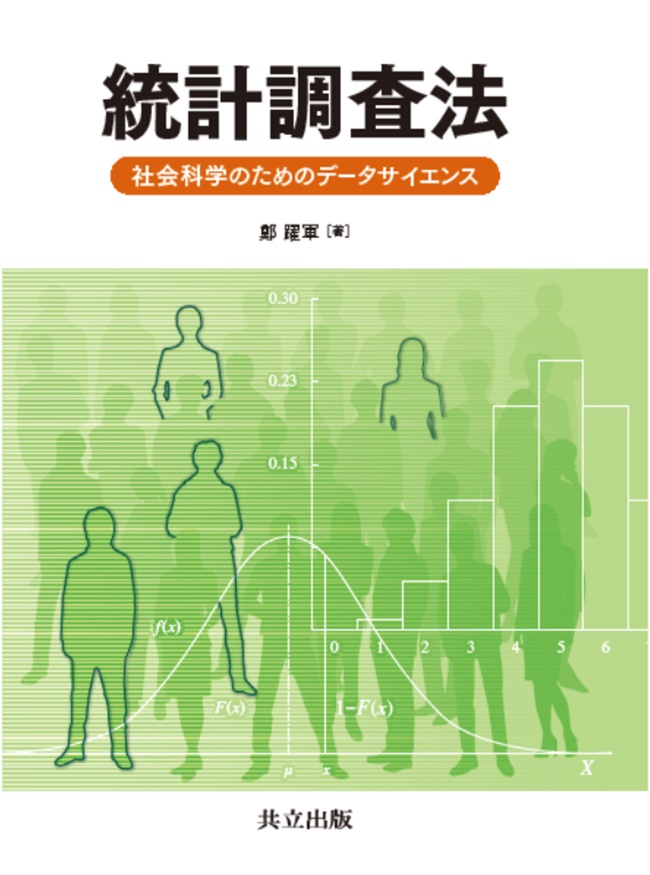
Accurate data and analysis captures the “heart”
``Suppose there are social problems that need to be solved, but individual subjective judgments cannot objectively interpret the wide variety of problems.Scientific verification based on data is required. Quantitative sociology is the development of methods to quantitatively explore the relationships, causal relationships, and internal structures of things in society, using data to understand the mechanisms of human society, people's consciousness, and behavioral patterns, and to conduct demonstrations based on these methods. It is a field of study that conducts groundbreaking research,” says Professor Chung.
So, in what situations is quantitative sociology actually used?Professor Chung gave an example of marketing using religious data.When companies expand overseas business, they investigate local religions and the percentage of believers.The data obtained will serve as an objective, scientific basis for deciphering gender differences based on religious views and consumer behavior. ``A management system that has been successful in Japan does not necessarily translate to being accepted overseas as is.So, what should we focus on when developing marketing?It changes not only by religious views, but also by gender and generation.Is quality important? ``Design is important, and we formulate corporate strategies based on data.''In order to appeal to people's feelings, it is necessary to find a logical angle.It can be said that this is an academic field that is typical of the Faculty of Culture and Information Studies, which advocates the ``integration of humanities and sciences.''
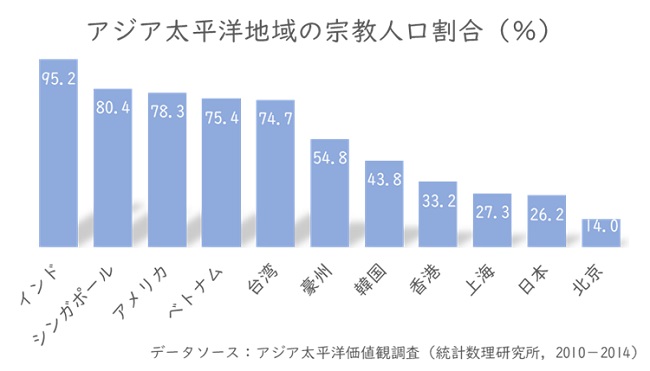
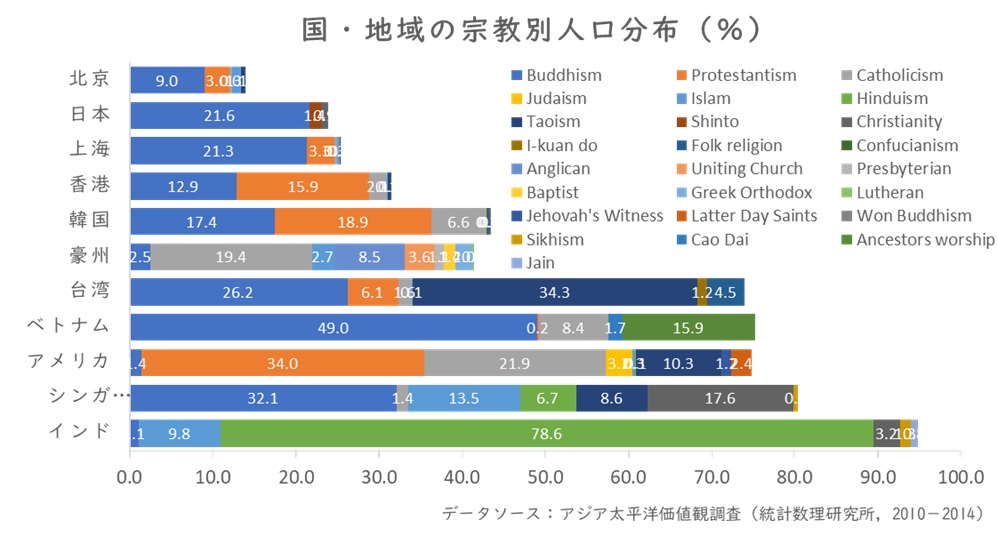
Figure 1 Religious beliefs in the Asia-Pacific region
Characteristics of the Japanese people seen through international comparison of environmental issues
Professor Jeong, whose original specialty was forest science, talks about how he came to study quantitative sociology. ``There is an idea called ``forest sociology.'' A forest is made up of individual trees, and each tree has individual differences and competes with each other. It is exactly the same as the analysis of society.Human society has lived in forest society.Humans have also managed and cultivated forests for timber resources.Currently, we are seeing the mutual relationship between forests and humans. The world is collapsing, and there is an urgent need to take measures to address environmental problems. At the root of these problems are human activities. In order to improve even the slightest bit of problems such as climate change and natural destruction, it is necessary to analyze the way people live. I think we need to reconsider."
When we focus on environmental issues, research data from various countries around the world is collected.The discussion naturally progressed to consideration of international comparisons.Professor Chung took up the example of Germany, an environmentally advanced country.In Germany, children learn about the relationship between the natural environment and human life through woodworking experiences at school and in the community.Even when they become adults, they continue to act in a way that respects nature in their daily lives.So, wouldn't the problem be solved if Japan's school education is reformed using this data as a reference?The interesting thing about human society is that it's not that simple.
“Can Japan become an environmentally advanced country if it does the same thing as Germany? Unfortunately, the next thing it runs into is the barrier of national character.Most Japanese people think that something must be done about environmental issues. However, less than one-third of people say they actually take countermeasures and ingenuity in their daily lives.It is difficult to explain the reason for this in a few words, but It is no exaggeration to say that one of the reasons is that each person has a selfish mindset.In other words, ``Even if I act alone, nothing will change, and since everyone else is not doing it, I don't want to try my best.'' I think it's a manifestation of consciousness."
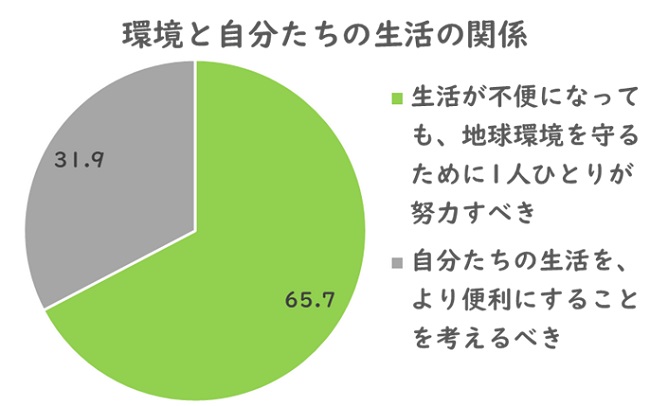
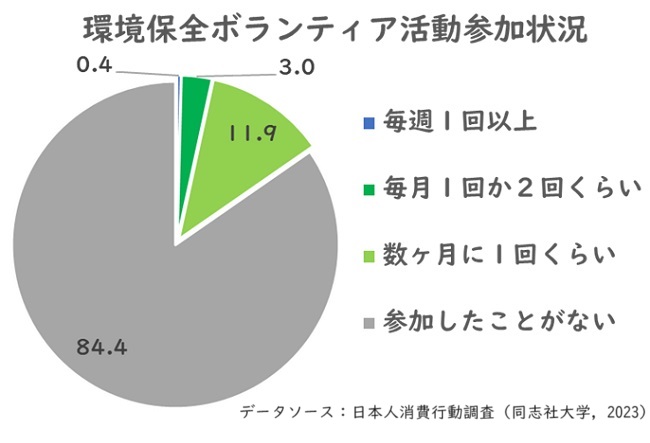
Figure 2 Current level of Japanese people's interest in the environment and environmental conservation behavior
The national character of the Japanese people that Professor Chung deciphered from the data is connected to Japan's unique culture of honne and tatemae.He points out that the Japanese people's ``attitude to make ambiguity a virtue'' slows down the speed at which they tackle problems. ``Each Japanese person has a clear answer.However, because they listen to what's going on around them, they end up being slow to act.As they read the atmosphere, their problems tend to fade.'' We often forget about it, or when we come up with a plan, it misses the mark. I'm sure you've all noticed this before."
It is important to understand the national character of the Japanese people through the collection and analysis of statistical data, and then create a system that suits them.In Professor Chung's opinion, it is more effective for Japanese people to mobilize the majority and influence individuals rather than being forced to do so.For example, if we provide facilities and equipment that allow people to take environmentally friendly actions in a variety of daily situations and gain a sense of satisfaction from doing so, the number of people who take action will increase.Professor Chung believes that rather than making specific calls, it is better to let people guide themselves naturally.There seems to be still room for improvement in areas such as garbage separation.What we vaguely feel on a daily basis becomes a certainty when backed up by data.
→The charm of data science that can be combined with various fields
- 1
- 2

